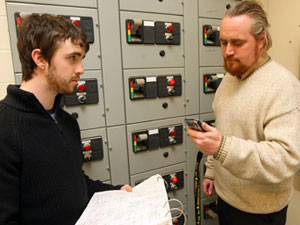 |
| Graham Carey and Mateo Yorke check energyconsumption levels. (Nick Pearce Photo) |
There was a lot of coverage of the 2010 Vancouver WinterOlympics, but you may not have heard about another importantOlympic competition that took place at your very own school âthe Eco Olympics.
After a close battle in two different consumption challenges,electricity and water reduction, Gerard Hall came through as thewinner of both challenges here at Dal.
The Eco Olympics is a sustainability competition among more than30 residences from various maritime universities. The firstchallenge and main event was the Residence Energy ConsumptionChallenge, from January 17 until February 20.
The week before the challenge began, a baseline measurement wastaken of how much electricity each residence typically uses. Overthe following five weeks, the energy consumption of each residencewas monitored.
â(Engagement) seemed pretty good, depending on thebuilding,â said the facilities building manager, Mateo Yorke.âGerard and Risley were two buildings that participated andshowed major improvements.â
'Engaged'
âThe students at Risley asked to see if we could changethe hours that the hallway lights were on and things like that. Wewere able to accommodate them. So they came up with the ideas. Theywere pretty engaged in the process.â
Howe Hall stayed around its baseline, while Shirreff and Elizacut back electricity consumption by 1.2%. âIn Risley, Ibelieve, there was one initiative to not use the elevator, to usethe stairs instead,â said student Graham Carey, chair of theGreen Residence Initiatives Panel.
There were mini events going on throughout the challenge,where the residences would have everything turned off orunplugged.
Mr. Yorke says this is a great challenge since students inresidence do not get a chance to see the electricity bill. Byproviding feedback to students on their consumption, they areâactually getting some accountability and that gives them achance to respond.â
Another great aspect of the challenge that he noted is its longlength of time â long enough to form a habit.
âEarth Hour is one of the events that weâve done inthe past where people shut everything off for an hour. Thatâsgreat because you can do all sorts of posters and informationleading up to that one hour. But for people to sustain this forfour or five weeks and see real change over that time is quitephenomenal,â he said.
'Malleable minds'
"Students represent a large group of malleable minds thatyou can show how to do things sustainably, how to keep energy usedown, how to keep your water use down, how to keep your wastedown," added Mr. Carey. "So when they leave residence,theyâll have these skills developed and hopefully keepapplying them.â
Unfortunately, some electric pumps were on at Gerard during thebaseline week, so the initial results were delayed until a newbaseline measurement could reveal the winner.
The second challenge involved reducing water consumption.Students from Gerard received their trophy at the awards ceremonyin the Rowe building earlier this month.
Although this is the third year that HÂş» has run energycompetitions, this is the first year that one has been done on alarge scale and against other universities, noted Mr.Yorke. The other participating universities are: University ofPrince Edward Island, Holland College, St. Francis XavierUniversity, Mount Allison University, and the University of NewBrunswick.
